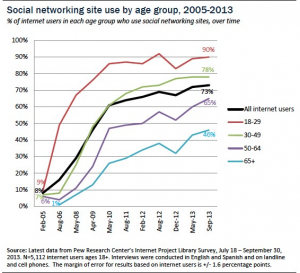
The last time one of your biz or blog tools wasn’t working, what was your first thought?
A: Why the freak can’t I figure this out?
B: Why the fraggle isn’t this working?
Silly curses aside, the answers seem similar. But they can tell you a lot about yourself. And being aware of it can help you learn more and build your blog faster.
When you choose A, you think the problem is with the user, and there’s something you’re doing wrong.
Maybe it’s because that’s always your first instinct (we’re all allowed to be insecure sometimes). Maybe it’s because you just started using that tool – you’re enough of a newbie for mistakes to be common. Maybe it’s because you’re doing a task you find particularly difficult, and oopsies have happened before.
When you choose B, you’re assuming the problem is with the tool. Again, lots of possible reasons why.
Maybe you’ve tried to do what you’re doing a few times, have double and triple checked that everything’s dandy on your end. Maybe the software’s been unreliable before.
Maybe you have a massive ego and it’s never occurred to you that you’re wrong before, or maybe you’re really brilliant and have never made a mistake (although I doubt any of you fall into these last two groups).
Now, is your first instinct to assume you’re at fault? It sounds bad. It makes it seem like you have low self-esteem. But you can train yourself to choose A. And to be a better blogger, you should.
The Gist
If you assume tech problems are your own fault, then you take on the responsibility of solving them. At least trying – spending 15 minutes in the knowledge base or on Google, or doing basic troubleshooting. Instead of just submitting a support ticket and waiting for it to be solved for you. And you learn a hell of a lot more in the process.
If you’re thinking, “I don’t have time,” don’t think of it as time spent troubleshooting. Think of it as time spent on professional development, because that’s what it is. You’re learning new skills and improving the ones you have.
My 2 a.m. “Aha!” Moment
The other night, I was working in one of my go-to tools and got stuck on something. I dug around for a few minutes to make sure it wasn’t a super simple fix before submitting a support ticket. As I usually do, I double-check the stuff I entered, went through the steps again, basic troubleshooting.
But normally if I didn’t figure it out after that, I’d just submit a ticket.
Things were different on Monday. It was 2am, and I knew the company’s support team was in the same time zone as me. So submitting a ticket now vs. when I woke up in the morning wouldn’t make much of a difference.
And it wasn’t timely at all, since the issue wasn’t with a frequently used feature. Really, I was just curious and playing around and wanted to figure it out for future ideas.
So instead of my normal routine, I decided to dig deeper.
I looked for external tutorials on the topic. I got pretty creative searching their knowledge base. I played around with the finicky feature, trying different options and whatnot than I had before.
And sure enough, problem solved in 15 minutes.
That’s probably less than I would have eventually spent going back and forth with support and testing out the possible solutions they’d offer. The same solutions I found on Google on my own, in 5 minutes.
But I don’t really care about that.
What was really awesome is that I learned so much more about that feature in the process. I can do things with it I didn’t even know existed 4 days ago.
And if I had assumed the problem was a software bug, that never would have happened.
Even if support had gotten back to me saying, “Actually, it’s on your end and here’s how you can fix it…”, I wouldn’t have figured it out for myself. And knowing this company and their awesome customer support, they actually would’ve been more like, “It was actually on your end, but we’re the best and already fixed it for you! In the future, here’s how to do it…”
So much less satisfying, right?!
You’ve Got to Be a DIYer
There’s no way around it. When you run your own, blog, your own business, your own anything, you need to learn how to get shit done on your own.
Not because you’ll actually have to do everything on your own. That would suck.
And I mean, proceed with caution. Don’t do anything stupid like change an important file on your site when you’ve no clue what you’re doing. If you’re a real daredevil, at least back up first. 10 times.
The point of this post isn’t to go rogue with tech tools you don’t know how to use. It’s to put yourself in a mindset to better understand the tools you use and to use all those problem solving skills you’ve picked up.
Isn’t it good to know you could do it all if you had to? Isn’t it nice to have the option of fixing something yourself?
Knowing if something breaks at 2am when a company’s support reps are asleep, it won’t throw a wrench in your business. That you’re badass enough to figure out some code when you’re not a coder. To DIY a graphic you’re proud of when your usual designer is on vacation.
Don’t learn to rely completely on the expertise of others. It can end up biting you in the ass in the long run, and it’s a whole lot less satisfying.
Digital & Social Articles on Business 2 Community(105)
Report Post







